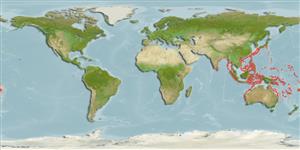Classification / Names
Common names | Synonyms | Catalog of Fishes(genus, species) | ITIS | CoL | WoRMS | Cloffa
Teleostei (teleosts) >
Acropomatiformes (Oceanic basses) >
Synagropidae (Splitfin ocean-basses)
Etymology: glossodon: Name from Greek 'glossa' for tongue and 'odous' for teeth, referring to the teeth on the tongue, the main diagnostic character of this species.
Environment: milieu / climate zone / depth range / distribution range
Ecology
Marine; bathydemersal; depth range 156 - 320 m (Ref. 116586). Tropical
Western Pacific: Philippines and around Indonesia, north to Taiwan and south to northern Australia; with a single specimen caught in eastern Indian Ocean, off Myanmar.
Size / Weight / Age
Maturity: Lm ? range ? - ? cm
Max length : 9.0 cm SL male/unsexed; (Ref. 116586)
Short description
Identification keys | Morphology | Morphometrics
Dorsal spines (total): 10; Dorsal soft rays (total): 9; Anal spines: 2; Anal soft rays: 7. This moderately deep-bodied species is distinguished by the following characters: convex dorsal head profile; A II + 7; pectoral-fin rays 14-16 rays with pectoral length 24-28.5% SL; gill rakers 16-20; pseudobranchial filaments broad 15-25, increasing with size; first anal-fin pterygiophore is long, straight and slender, with narrow, hollow tip; vomer broad, triangular, rounded posteriorly, and with many granular teeth; palatine and ectopterygoid with 2-4 rows of granular teeth; tongue with long central band of densely packed granular teeth; orbital diameter 11.7-13.3% SL; absence of longitudinal ridges on preopercular lobe; otolith compact (OL:OH = 1.6-1.7) (Ref. 116586).
This species was observed and collected in association with the Sakura shrimp, Lucensosergia lucens (Hansen, 1922) in Taiwan during fishing season (December-May) in mid-water trawls, together with Parascombrops yamanouei and other pelagic fishes like bregmacerotids and surface-migrating myctophids. In the Arafura Sea, it was collected in association with demersal fishes like Acropoma japonicum Günther, 1859, Malakichthys levis Yamanoue & Matsuura, 2001, Owstonia aff. Pectinifer (Myers, 1939) and Bembrops spp. at depth close to sea bottom but not far from a major drop-off. (Ref. 116586).
Life cycle and mating behavior
Maturity | Reproduction | Spawning | Eggs | Fecundity | Larvae
Schwarzhans, W.W. and A.M. Prokofiev, 2017. Reappraisal of Synagrops, Günther, 1887 with rehabilitation and revision of Parascombrops Alcock, 1889 including description of seven new species and two new genera (Perciformes: Acropomatidae). Zootaxa 4260(1):1-74. (Ref. 116586)
IUCN Red List Status (Ref. 130435: Version 2024-1)
Threat to humans
Harmless
Human uses
Tools
Special reports
Download XML
Internet sources
Estimates based on models
Phylogenetic diversity index (Ref.
82804): PD
50 = 0.5001 [Uniqueness, from 0.5 = low to 2.0 = high].
Bayesian length-weight: a=0.00977 (0.00436 - 0.02192), b=3.01 (2.81 - 3.21), in cm total length, based on LWR estimates for this (Sub)family-body shape (Ref.
93245).
Trophic level (Ref.
69278): 3.4 ±0.5 se; based on size and trophs of closest relatives
Fishing Vulnerability (Ref.
59153): Low vulnerability (10 of 100).
